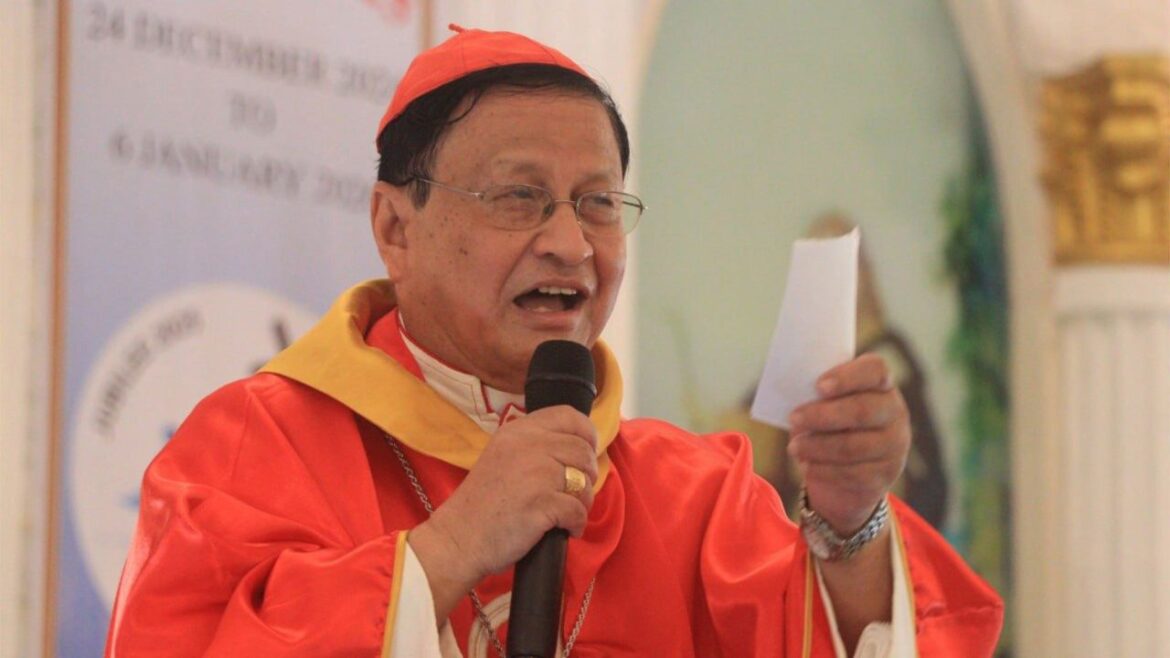With the ongoing conflict in Myanmar and in the wake of Pope Leo’s appeal for the nation, Myanmar’s Bishops issue a “message of compassion and hope for Myanmar’s polycrisis,” stressing that the emergency in the nation may be reaching all-time lows, but that peace is possible and achievable for the good of new generations.
By Deborah Castellano Lubov
“Across our beloved land, from north to south, east to west, our people are facing a crisis unlike any we have seen in recent history.”
The Catholic Bishops Conference of Myanmar (CBCM) gave this chilling reminder on 29 October, in their ‘Message of Compassion and Hope for Myanmar’s Polycrisis,’ in which the nation’s bishops acknowledge that across Myanmar and beyond, they are experiencing a time of immense pain, uncertainty, and confusion.
The bishops clarify this is “not one single tragedy,” but “what experts call a polycrisis—where multiple emergencies come together, each one making the others worse.”
For the people of Myanmar and for the prelates, the days are heavy and nights are long, they note, as they continue facing “armed conflict, natural disasters, displacement, economic collapse, and a deep social fracture.”
Displacement and trauma
Turning to those suffering, the bishops recall that according to United Nations statistics, over 3 million people in Myanmar have been displaced from their homes since the conflict escalated.
“These are not just numbers. These are mothers, fathers, grandmothers, and children,” the CBCM bishops emphasize, lamenting that some are sheltering under trees, in rice fields, monasteries, and makeshift tents, and doing so without food, water, education, or safety.
In earthquake-affected areas, they decry how entire villages were flattened, buildings crumbled, and lives were lost in seconds.
“In conflict zones, towns have turned into ghost cities,” they point out, observing how numerous people have been displaced multiple times, “carrying not only bags of belongings but also deep trauma and fear.”
Silent Suffering of women and children
The bishops deplore how women and children, “as always in war and disaster, bear the heaviest burdens,” and how many children have been out of school for years, many hungry, with classrooms turned to rubble and having lost their parents.
The bishops say their futures are suspended in uncertainty.
“Women, too,” they stress, “are suffering quietly. They carry the pain of losing family, the responsibility of caring for the young, and the fear of exploitation. In some cases, they must give birth or raise infants with no shelter or healthcare.”
“And yet,” they observe, “they are also the ones holding communities together, cooking food for many, praying in the dark, and comforting the grieving.”
Lack of understanding among stakeholders
Moreover, Myanmar’s bishops call the lack of understanding and trust among all the different actors and stakeholders “one of the biggest wounds.”
“There are multiple sides, multiple visions, multiple needs. But often,” they lament, “there is little dialogue.”
“Because of this,” they note, “aid is blocked, development is delayed, and humanitarian access is restricted.” Often, civilians, who are not part of any conflict, “are caught in the middle, suffering the consequences.”
Young people, they also lament, aspire to study and achieve in life, but are often filled with fear, anger, and disillusionment, as their talents are wasted and hopes are buried, as several “flee the country,” while “others withdraw in silence.”
Living through daily hardships
Every day life for ordinary civilians, the bishops continue, has become a daily test of survival.
“In many parts of the country,” the Church leaders note, “Food prices have skyrocketed. Jobs have vanished. Fuel and medicine are scarce. Electricity comes and goes. Anxiety has become a silent companion in every household.”
Despite a climate of fear, the prelates observe, people with open hearts, even if “often with empty hands,” continue to help each other.
Christian approach to reconciliation and peace
“As a Christian and as someone who walks alongside all faiths,” the bishops state, “We ask: Where do we go from here? How to end all wars? Can we rise together and say no more wars in any part of the world? Christianity does not offer an easy escape from suffering.”
“But,” the prelates marvel, “it offers a path—a quiet, humble path—towards reconciliation, healing, and durable peace.”
“Reconciliation,” they recall, “does not mean forgetting or pretending everything is fine,” but rather means “listening to each other’s stories, weeping with those who weep, and seeking a common ground where no one has to lose for others to win.”
In this context, the bishops of Myanmar clarify that peace is not passive nor silent, but rather is “an active, courageous commitment to choosing life over death, dignity over revenge, community over isolation.”
Peace is possible
Thus, they call on the faithful to maintain hope, stressing, “This is not a time to give up. This is a time to dig deeper,” and to find hope.
“Peace,” the Bishops of Myanmar encourage, “is possible; peace is the only way.”
Battered but determined to rise again
Moreover, the bishops reiterate that hatred cannot define them and that despair cannot win: “May our nation, bruised and battered,” they state, “rise again—not just with buildings, but with new hearts.”
Finally, they conclude, “May our children say one day, ‘They didn’t give up on peace. And so we found our way home.’”

